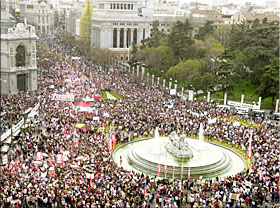PARIS/WASHINGTON, 16 March 2003 — Hundreds of thousands of protesters worldwide took to the streets yesterday to say “No” to any US-led invasion of Iraq in the biggest anti-war demonstration since millions joined a global march for peace last month.
The protests came on the eve of a crisis summit on Iraq on the Azores islands by the leaders of Britain, Spain and the United States, the chief advocates of using force to disarm Baghdad and oust President Saddam Hussein.
In Italy, an estimated 400,000 people descended on the economic and financial capital of Milan from all corners of the country, while in Spain some 300,000 people marched in Barcelona and Madrid, according to police.
In France, 55,000 people turned out for a rally in Paris and at least 4,500 people marched in the Mediterranean port of Marseille. “With or without UN, no to war in Iraq,” chanted the Paris protesters.
Some 15,000 people summoned by anti-globalization groups marched in Athens behind a giant replica of Picasso’s celebrated anti-war painting, Guernica. In Cyprus, some 2,000 Greek Cypriots banged drums, blew whistles and shouted anti-US slogans outside the US Embassy in Nicosia.
On the other side of the Atlantic, buses packed with protesters from more than 100 US cities arrived in Washington for what could be the last chance to protest and dissuade the Bush administration from invading Iraq. They aim to surround the White House and Justice Department in a “sea of humanity”.
Estimates put the Feb. 15 global turnout at upwards of four million. But this time, with war looking more likely, turnout appeared lower.
Kick-starting yesterday’s protests, around 10,000 marched in Tokyo and 3,000 in Bangkok, where pigeons were released into the skies over the Thai capital as a peace symbol. Protests were also reported in Vietnam, Australia and New Zealand.
People burned effigies of Bush in Calcutta, India, while demonstrators chanted: “Raise your hands against US imperialism”. Others held up placards depicting Bush as Hitler.
But amid the chants of “give peace a chance” in capitals around the world were pessimistic voices as well. “This is a symbol,” said Mohammed Abdel Quddus, a writer who joined about 300 marchers at Cairo University. “We know that we won’t prevent war, but we are just expressing our opposition.”
Speakers and marchers elsewhere insisted war was not inevitable — even in countries where the government is backing Washington’s hard-line stance. “We feel that there’s still time to get our government to change policy,” said Nic Maclellan, march coordinator in Melbourne, Australia, from where Prime Minister John Howard has already sent 2,000 troops to the Gulf.
In Iraq, there were state-organized marches with thousands of Iraqis vowing to defend Saddam. “We are your soldiers, Saddam, where will America get through?” youths chanted in Kerbala. In Baghdad, the crowd burned a US flag.
In neighboring Turkey, several thousand protested against the possible use of Turkish ports and air bases by the US military. Riot police blocked roads leading to the Mediterranean port of Iskenderun in southern Turkey to try to stop demonstrators gaining access to stores of US military equipment.
The demonstrations had little effect on Bush who braced the American people for war. As Bush spoke of his readiness to “confront a growing danger” in Iraq, Baghdad invited the top UN weapons inspectors to visit as soon as possible to discuss outstanding disarmament issues. A UN spokeswoman in Vienna said the inspectors would consult the Security Council tomorrow about the invitation. Bush said there was little hope Saddam would disarm. “Crucial days lie ahead for the free nations of the world,” Bush said in his weekly radio address. “There is no doubt: We will confront a growing danger, to protect ourselves, to remove a patron and protector of terror, and to keep the peace of the world.”
The tone of comments from Britain, where Prime Minister Tony Blair has been desperate for a clear UN mandate for any war to placate opponents in his Labour Party and country, was equally heavy. Foreign Secretary Jack Straw said war now looked “much more probable” and a minister said it may only be days away.
Diplomats at the United Nations said negotiations appeared to be all but over after Washington swiftly rejected a proposal by Chile to break the impasse over a second resolution.
Once diplomacy is exhausted, officials said, Bush would address the nation, issuing a final ultimatum to Saddam and giving aid workers and others time to leave Iraq.
In Iraq, UN weapons inspectors overseeing missile dismantling denied reports they had started to pull out.
More US warships headed for the Gulf, where 250,000 US and British troops are poised to strike at Iraq.


